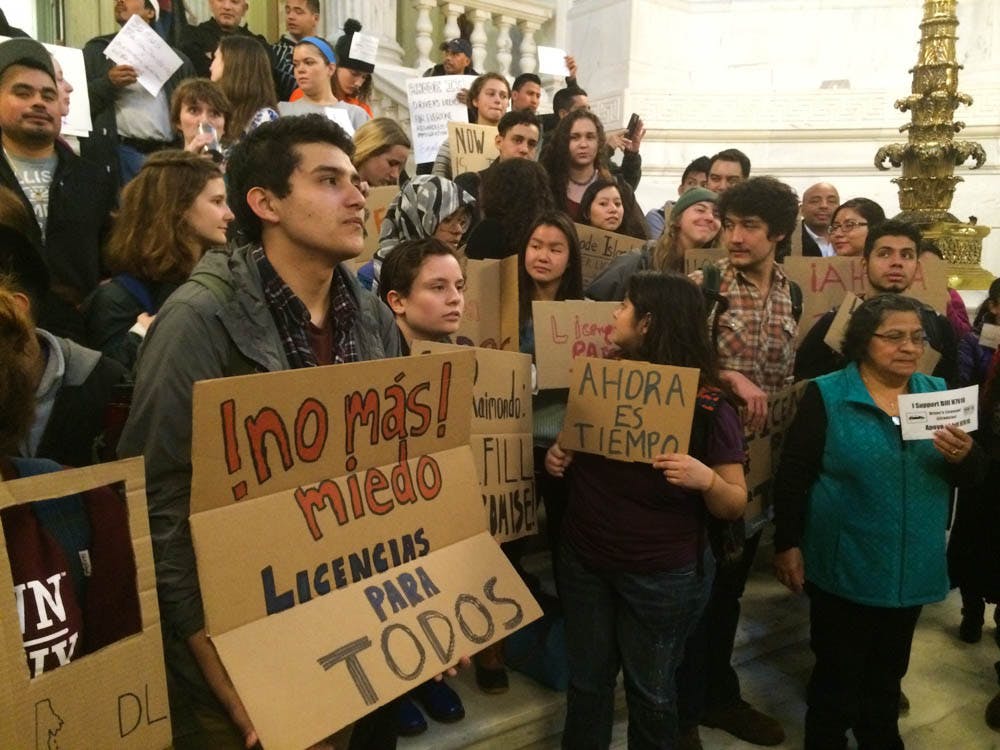Over 100 Rhode Islanders gathered at a Statehouse hearing Tuesday evening to demonstrate support for a bill that would allow undocumented immigrants to obtain driving privilege licenses, which would grant driving permission but not serve as a state ID. The bill aims to increase road safety and ameliorate the fears of many unlicensed residents in Rhode Island who are currently legally prohibited from driving.
Rep. Grace Diaz, D-Providence, a state representative since 2004 and proponent of the Development, Relief and Education of Alien Minors Act in Rhode Island, introduced the same legislation in 2006 and 2007, but it did not pass. More recently, Sen. Frank Ciccone, D-Providence and North Providence, introduced the same legislation last year, The Herald previously reported. Diaz cited the long legislative process as the biggest obstacle to the bill becoming law.
At the hearing, Rep. Anastasia Williams, D-Providence, one of the proposers of the bill, testified in favor of the legislation. She noted that regardless of legal status, “undocumented residents can be law-abiding citizens,” and the state of Rhode Island should afford them that right by granting them access to legal driving privileges.
Williams added that because immigrants may still attempt to drive whether they are legally permitted to or not, the state should grant them access to licenses to ensure they are driving with full knowledge of road laws.
Those without licenses are “forced to choose between giving their children access to education and following the law,” said Mayor Jorge Elorza. The bill would ensure that everyone on the road had passed a written driver’s test, creating a safer community and stronger economy by increasing access to employment, he added.
Elorza empathized with current advocates, noting his own experiences as the child of immigrant parents.
In addressing the R.I. House Judiciary Committee, Williams reminded the representatives that their ancestors were immigrants, too.
“We don’t look like the majority that’s in charge, but our needs are no different,” Williams said. “Immigrants are not going anywhere. They will be part of the fabric of this country from now until the end of time.”
James Diossa, mayor of Central Falls, Rhode Island echoed Elorza’s statements, saying, “We can’t wait for the federal government to make a path to citizenship” for undocumented immigrants. Granting them the right to drivers licenses regardless of legal status is a step in that direction.
But Terry Gorman, president and executive director of Rhode Islanders for Immigration Law Enforcement, an organization that advocates the enforcement of and increase in anti-illegal immigration laws, said that this bill would only guarantee “illegal aliens” the right to drive and does not imply any further legislation would occur in the state.
“I’m dead set against the bill. Period,” Gorman said. “I don’t believe that anybody who is here illegally should get any benefits” outside of the federally mandated K-12 education and emergency medical treatment, he added.
Rep. Arthur Corvese, D-North Providence, an opponent of the bill and advocate of legislation that would explicitly block renewal of licenses to those who cannot provide a Social Security number, said the state legislature needs to “make it clear that Rhode Island is no place for those who entered the country illegally.”
Currently, Rhode Island may prosecute undocumented immigrants for illegal activity but will not deport them because of their legal status.
But Corvese introduced another bill that would enforce federal immigration laws on a state and local level.
Granting undocumented immigrants rights to licenses would prove “destructive to our country and dangerous for Rhode Island,” Corvese said. Rhode Island needs to uphold federal laws, he added.
Gorman said he opposes the bill because of the cost, noting how some 18,000 to 20,000 immigrants would have access to licenses, which would place undue stress on the Department of Motor Vehicles. Some 63 languages are spoken in Rhode Island public schools, and Gorman questioned how the DMV would provide materials and instruction in so many languages without a huge cost to taxpayers.
Eduardo Sandoval, a supporter of the bill from Todos Somos Arizona, an organization that fights anti-immigration legislation, said that many immigrants were tired of living in fear of not obeying the law.
“All we want is to respect the rules,” said Giovanni Borillas, a Providence resident. “We need to do the right things.”
After learning of the hearing last week, Sandoval and other Todos Somos organizers rallied supporters by advertising the hearing in church, on the radio and in newspapers in both English and Spanish. Over a hundred demonstrators arrived at the Statehouse, many with signs and all in favor of the bill’s eventual passage.
Diaz said she had never seen such an energized and diverse crowd in support of a bill. “The diversity is amazing and beautiful.”
Diaz was unsure how the legislation would pan out. After two more hearings, the committee will vote on the legislation, at which point it will go to the House floor. Should it pass, the Senate Judiciary Committee would need to review it before the Senate votes.
Diaz noted that many of the 75 House representatives do not represent Latinos and “don’t understand the importance of the issue.”
The House Judiciary Committee recommended the bill be held for further study.





